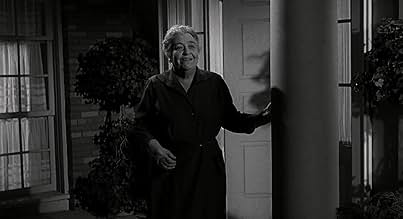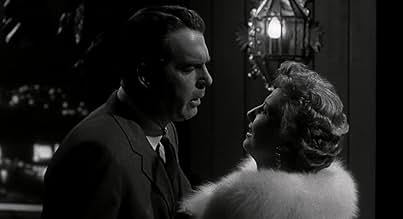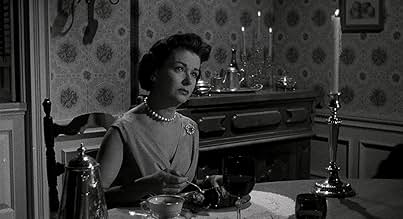IMDb RATING
7.4/10
4.1K
YOUR RATING
When a toy manufacturer feels ignored and unappreciated by his wife and children, he begins to rekindle a past love when a former employee comes back into his life.When a toy manufacturer feels ignored and unappreciated by his wife and children, he begins to rekindle a past love when a former employee comes back into his life.When a toy manufacturer feels ignored and unappreciated by his wife and children, he begins to rekindle a past love when a former employee comes back into his life.
- Director
- Writers
- Stars
- Director
- Writers
- All cast & crew
- Production, box office & more at IMDbPro
7.44K
1
2
3
4
5
6
7
8
9
10
Featured reviews
There's Always Tomorrow
I can not stand Vinny's character. He is so "full of himself." The youngest daughter Frankie drove me crazy with her whining!
Excellent performances by Stanwyck, MacMurray, and Bennett. This is one of the last movies Stanwyck and MacMurray made together, she was as beautiful in this movie as in any of her 1940's movies. She's timeless and such a wonderful actress. For those of you who really like Fred, and want a real treat... Check out the movies "Miracle of the Bells," and "Suddenly it's Spring!" Fred Mac Murray and Barbara Stanwyck were such underrated actors/actresses of their time. Joan Bennett plays her part so well you understand why the household is the way it is. Great love story, if you can get through the kids!
Excellent performances by Stanwyck, MacMurray, and Bennett. This is one of the last movies Stanwyck and MacMurray made together, she was as beautiful in this movie as in any of her 1940's movies. She's timeless and such a wonderful actress. For those of you who really like Fred, and want a real treat... Check out the movies "Miracle of the Bells," and "Suddenly it's Spring!" Fred Mac Murray and Barbara Stanwyck were such underrated actors/actresses of their time. Joan Bennett plays her part so well you understand why the household is the way it is. Great love story, if you can get through the kids!
10Savor
An outstanding hidden treasure waiting to be rediscovered.
This film is one of the great Hollywood films yet so few have ever heard of. Not only does it rate with Douglas Sirk's better known films ("Magnificent Obsession," "All that Heaven Allows," and "Imitation of Life), but is as much a devastating a critique of the American Dream as other fifties movies like "Bigger Than Life." And unlike many melodramas which center on the emotional isolation and turmoil of the central female character, this one analyzes the pain of the main male figure (Fred MacMurray). The film's acting, direction, and script have a precision so well thought out that the effect--both at any given moment and overall --is absolutely astonishing. An incredible film crying out to be rediscovered.
Sirk's most overlooked movie - certainly amongst his best
Douglas Sirk is renowned for injecting his subversive criticism of American society of the fifties in his glossy and glamorous melodramas. What made this palatable to the public, who flocked in droves, was the fact that the families involved were showbiz families ("Imitation of Life"), filthy rich oil magnates ("Written in the Wind") or highly idealized to the point of caricature ("All that Heaven Allows", "Magnificent Obsession"), far from the average movie goers own social milieu. And of course up there on the screen were the glamorous stars, Rock Hudson, Lana Turner, Lauren Bacall, Dorothy Malone, etc. Movie fans will recall the aforementioned movies when the topic of Sirk's movies arises. It is highly unlikely that "There's Always Tomorrow" will get a mention. "There's Always Tomorrow" has barely any gloss or glamour. The social criticism is completely without disguise. The family in question is one that the vast majority of movie goers could very easily identify with. Its stars (Fred MacMurray and a not so young Barbara Stanwyk) are not glamorous. While audiences left the cinema entranced by the glorious melodrama of "Imitation of Life" and "Written on the Wind", they would have left "There's Always Tomorrow" feeling a lot less secure about their own lives, since it's a film that touches on a fair amount of "dangerous" territory, calling into question the very foundations of the American family. Douglas Sirk's sense of irony has never been sharper. The title brims with optimism and the film opens with the script, "Once Upon a Time in Sunny California". But what unfolds is a bleak, pessimistic depiction of middle class family life.
While Sirk's films have often been branded "woman's pictures", "There's Always Tomorrow" is indeed very much a man's picture. It takes a hard and deep look at the role of the male breadwinner and the picture it comes up with is not a pretty one. What we are shown is a man who when young, courted the prettiest girl, married, had children and worked hard to build up a successful business. He is now middle aged and having achieved it all, begins to feel himself taken for granted by his wife and children. His needs are completely neglected. His wife has little interest in him sexually being totally wrapped up in fulfilling the unending needs of their self centered ungrateful children. It's a scenario all too familiar to millions of men. Fred MacMurrays's Clifford Groves has become a robot similar to the one his successful toy manufacturer has created. No wonder that Norma Vale's (Stanwyk) reappearance in his life presents an opportunity to regain his lost dreams. She's an independent career woman, who sees his situation as somewhat idyllic from the outside. But with the usual intelligence of a Stanwyk character, she has no illusions as to a possible future with him. Despite the brief and obligatory conciliatory ending, Clifford Groves' future does not bode well. It should come as no surprise that the film was not well received at the box office.
"There's Always Tomorrow" has many of the hallmarks of Sirk's craftsmanship. The studio refused to grant him his request for the film to be shot in color, despite having provided Universal with some of its highest grossing pictures of the decade. At least his demand for his favorite cameraman Russell Metty was granted. Metty as always, was the perfect partner in realising Sirk's vision. His interior filming in particular is a lesson in cinematography. He had a penchant for shooting characters behind banisters, framed in mirrors and caged behind fences to enhance the sense of their being trapped. MacMurray and Stanwyk are constantly gliding through dark shadow and bright light reflecting the inherent brightness and darkness in their lives.
At this point of writing "There's Always Tomorrow" has not been released in any format and rarely gets a showing on television. It's a gross injustice to an extremely important director and a wonderfully made, moving piece of cinema.
While Sirk's films have often been branded "woman's pictures", "There's Always Tomorrow" is indeed very much a man's picture. It takes a hard and deep look at the role of the male breadwinner and the picture it comes up with is not a pretty one. What we are shown is a man who when young, courted the prettiest girl, married, had children and worked hard to build up a successful business. He is now middle aged and having achieved it all, begins to feel himself taken for granted by his wife and children. His needs are completely neglected. His wife has little interest in him sexually being totally wrapped up in fulfilling the unending needs of their self centered ungrateful children. It's a scenario all too familiar to millions of men. Fred MacMurrays's Clifford Groves has become a robot similar to the one his successful toy manufacturer has created. No wonder that Norma Vale's (Stanwyk) reappearance in his life presents an opportunity to regain his lost dreams. She's an independent career woman, who sees his situation as somewhat idyllic from the outside. But with the usual intelligence of a Stanwyk character, she has no illusions as to a possible future with him. Despite the brief and obligatory conciliatory ending, Clifford Groves' future does not bode well. It should come as no surprise that the film was not well received at the box office.
"There's Always Tomorrow" has many of the hallmarks of Sirk's craftsmanship. The studio refused to grant him his request for the film to be shot in color, despite having provided Universal with some of its highest grossing pictures of the decade. At least his demand for his favorite cameraman Russell Metty was granted. Metty as always, was the perfect partner in realising Sirk's vision. His interior filming in particular is a lesson in cinematography. He had a penchant for shooting characters behind banisters, framed in mirrors and caged behind fences to enhance the sense of their being trapped. MacMurray and Stanwyk are constantly gliding through dark shadow and bright light reflecting the inherent brightness and darkness in their lives.
At this point of writing "There's Always Tomorrow" has not been released in any format and rarely gets a showing on television. It's a gross injustice to an extremely important director and a wonderfully made, moving piece of cinema.
Classy drama for the Double Indemnity pair
Stylish drama acted expertly by super professionals. The powerful duo of Stanwyck and MacMurray excel when paired together and this is a fine example of that. Sadly this film is somewhat obscure, a shame since it really does examine in simple terms the crisis a man faces when he realizes he has fallen into a rut without being aware of it. Another winner from Sirk and perhaps even better then some of his more renown films, which are certainly enjoyable if sometimes over the top and a little lurid, since this drama is muted and closer to real life. The problems the film examines seem rooted in the 50's consumerism but by looking a little deeper they are revealed to be universal and timeless issues. This was the final pairing of Barbara and Fred, all their collaborations are worth watching, although The Moonlighter is rather sketchy, but this is the only one showing them as a mature pair and it's a pity they didn't have a chance to make perhaps one more when they had reached old age since they brought out the best in each other.
Wrong said Fred
Yet another impressive Douglas Sirk melodrama centring on the contemporary American family and in this particular film the American husband / father figure. Most of the Sirk movies I've seen seem to put women at the heart of the action but here the emotional crisis is thrust upon Fred MacMurray's toy salesman, a conventional, dutiful husband and father to his three growing children, one boy on the verge of adulthood, one daughter in her late teen, mildly rebellious years and another somewhat childish younger teenager. His wife, played by Joan Bennett, seems preoccupied with the needs and wants of these rather selfish children to the point where she seems ignorant of the effect the cumulative family disinterest is having on his emotional needs.
Just as he's feeling especially insignificant along comes old flame Barbara Stanwyck in her third fine film with MacMurray to fan the sparks of his mid-life crisis into a full-blown blazing passion, to the extent where he has a secret if accidental weekend away with her and quickly comes to contemplate leaving his family for a life of excitement with her. Which way will he turn and what part will his two mortified older children, who in typical Sirkian grand coincidental fashion, learn of his plans, play in his final decision?
Once again, Sirk brings family members to a crisis-point and even if the resolution this time takes a conventional course, still there's real drama in these excellently crafted and written scenes of anything but cosy domesticity. Cynics may make sneering remarks about all this amounting to shallow soap operatics but I think they would be wrong. Post-War Western and especially American society was evolving even against the "I Like Ike" background of greater personal wealth and the growth in consumerism but just under the surface it wasn't all sweetness and light and Sirk was one director who caught that change in attitudes in his mid-50's work.
Once again MacMurray surprised me with the depth and roundedness of his performance as a middle-aged man cornered by society's expectations of him while Stanwyck in one of her last major roles before she, like MacMurray a bit later, turned to TV, is as good as she usually is as the unwitting Eve in Fred's supposed Garden of Eden. Her character of a flamboyant, self-confident, but importantly unmarried career-woman is equally worthy of deeper investigation as MacMurray's worm-turning Mr Suburbia.
Lesser known than other Sirk dramas of the decade it's as good as any of them in my opinion and well worth watching.
Just as he's feeling especially insignificant along comes old flame Barbara Stanwyck in her third fine film with MacMurray to fan the sparks of his mid-life crisis into a full-blown blazing passion, to the extent where he has a secret if accidental weekend away with her and quickly comes to contemplate leaving his family for a life of excitement with her. Which way will he turn and what part will his two mortified older children, who in typical Sirkian grand coincidental fashion, learn of his plans, play in his final decision?
Once again, Sirk brings family members to a crisis-point and even if the resolution this time takes a conventional course, still there's real drama in these excellently crafted and written scenes of anything but cosy domesticity. Cynics may make sneering remarks about all this amounting to shallow soap operatics but I think they would be wrong. Post-War Western and especially American society was evolving even against the "I Like Ike" background of greater personal wealth and the growth in consumerism but just under the surface it wasn't all sweetness and light and Sirk was one director who caught that change in attitudes in his mid-50's work.
Once again MacMurray surprised me with the depth and roundedness of his performance as a middle-aged man cornered by society's expectations of him while Stanwyck in one of her last major roles before she, like MacMurray a bit later, turned to TV, is as good as she usually is as the unwitting Eve in Fred's supposed Garden of Eden. Her character of a flamboyant, self-confident, but importantly unmarried career-woman is equally worthy of deeper investigation as MacMurray's worm-turning Mr Suburbia.
Lesser known than other Sirk dramas of the decade it's as good as any of them in my opinion and well worth watching.
Did you know
- TriviaAcclaimed documentary filmmaker Errol Morris named it as one of his 10 favorite films in the 2002 BFI Sight & Sound Poll.
- GoofsNear the end, Vinnie is telling his girlfriend that he was wrong "about Norma and Cliff" in these exact words. But Cliff is his father; he wouldn't refer to his father by his first name.
- Quotes
Norma Miller Vale: Love is a very reckless thing. Maybe it isn't even a good thing. When you're young and in love, nothing matters except your own satisfaction. The tragic thing about growing older is that you can't be quite as reckless anymore.
- SoundtracksBlue Moon
(uncredited)
Written by Richard Rodgers and Lorenz Hart
Played on one of the toys and heard as a theme throughout the film
- How long is There's Always Tomorrow?Powered by Alexa
Details
- Runtime
- 1h 24m(84 min)
- Color
- Aspect ratio
- 1.85 : 1
Contribute to this page
Suggest an edit or add missing content





































